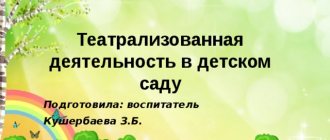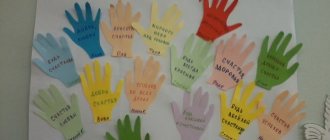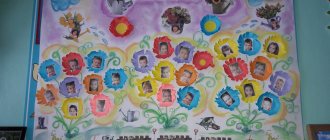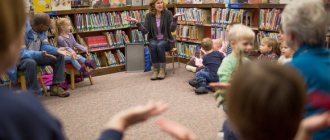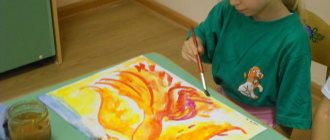Normative base
Resolution of the Chief State Sanitary Doctor of the Russian Federation dated May 15, 2013 N 26 “On approval of SanPiN 2.4.1.3049-13 “Sanitary and epidemiological requirements for the design, maintenance and organization of the operating regime of preschool educational organizations”
Order of the Ministry of Labor of Russia dated October 18, 2013 N 544n “On approval professional standard “Teacher (pedagogical activity in the field of preschool, primary general, basic general, secondary general education) (educator, teacher)”
Federal Law of December 29, 2012 N 273-FZ “On Education in the Russian Federation”
Order of the Ministry of Education and Science of Russia dated August 30, 2013 N 1014 “On approval of the Procedure for organizing and implementing educational activities in basic general education programs - educational programs of preschool education”
Who is a kindergarten teacher?
Upbringing, education, care, supervision - these are the responsibilities of a kindergarten teacher in 2020. Important and mandatory qualities of a teacher are kindness, goodwill, hard work, responsibility, accuracy and resistance to stress. These criteria are enshrined in:
- job description;
- SanPiN 2.4.1.3049-13;
- employment contract.
A kindergarten teacher must love children, have a great desire to become their first guide into adulthood, be able to resolve conflicts, find an approach to each child, provide first aid and cuddle. An employee must take care of his appearance, be able to speak correctly, and find an approach not only to students, but also to their parents. A preschool teacher is an important and responsible job, where you must always be in a good mood and in a good mood. The functional responsibilities of a teacher presuppose that the specialist has a positive attitude towards the child, knows how to treat any child equally, regardless of his behavior, and takes into account the individuality of each pupil.
Promote a sense of solidarity and connection between adults
When a parent demonstrates that he likes another adult, then most likely the child will listen to his opinion. On an instinctive level, the child's brain says: “If you like this person, then I will like him too.” When they see how we treat another person with warmth and delight, and that we enjoy communicating with them, children are more likely to follow us.
This requires us to be careful when we talk about other adults in our children's lives, and remember that what they hear will influence how they feel about those people. For example, when a new teacher comes to a child's class, we should express approval and interest in this person, and also encourage the child to share his feelings about the new teacher.
General provisions
Typically, persons with secondary vocational or higher education in the field of pedagogy, preschool education, psychology or sociology are appointed to the position of educator, preferably with work experience, knowledge of child psychology and speech therapy, methods of development of preschool children. Completion of advanced training courses is desirable.
Familiarity with the job responsibilities of a preschool teacher occurs even before the signing of an employment contract. The employee needs to understand that in order to effectively perform his job, he must have certain personal qualities, because in the profession of an educator they are very important. The most important qualities include:
- love for children and the ability to find an approach to any child;
- organizing abilities;
- positivity and cheerfulness;
- stress and psychological stability;
- communication skills and organization;
- speech literacy and high cultural level;
- the ability to make quick and correct decisions in any situation.
Functions
A professional standard is necessary for an employer to understand clear functional requirements for an employee. Order No. 544n dated October 18, 2013 “On approval of the professional standard Teacher (teaching activities in the field of preschool, primary general, basic general, secondary general education) (educator, teacher)” also approved the responsibilities of the teacher when admitting children to the group:
- regulation of student behavior to ensure a safe educational environment;
- implementation of educational opportunities for various types of child activities (educational, play, work, sports, artistic, etc.);
- development of students' cognitive activity, independence, initiative, creative abilities, formation of citizenship, ability to work and live in the modern world, formation of a culture of healthy and safe lifestyle among students;
- the use of constructive educational efforts of parents (legal representatives) of students, assistance to the family in resolving issues of raising a child.
“Parent hour” as a form of working with parents in the project
Nadezhda Betz
“Parent hour” as a form of working with parents in the project
Hello! Hello! Hello! I am dedicating this third post to the educational and research project “Vegetable garden on the windowsill.” Today’s photo report is entirely dedicated to my wonderful parents, or rather mothers, their work in educating and raising children together with their teacher.
Four school years are spent in my group “Galchata” “Parenting Hours”. This form of work was invented by me with the aim of close cooperation with the families of pupils, involving them in the educational and creative process. Once at a meeting I suggested: “If you have something to say not only to your child, but to everyone who is next to him day after day, I invite you to “Parent Hour.” It can be carried out in completely different forms: conversation, game, theater, reading, presentation, excursion, creative workshop, etc. And now there are four years of successful cooperation! This is a long journey, a lot of work, relationship experience, mutual respect, getting to know each other!
“Vegetable garden on the windowsill” also could not do without “parental hours”. Each family chose a vegetable and prepared a presentation for the children. Moms compiled material that will be included in a large general album about vegetable crops: brief information - where and when they were brought to Russia; composition and usefulness; in what form it is eaten (vegetable dishes). We also collected riddles, poems, songs, and nursery rhymes.
As with all my requests, my mothers reacted creatively and with full responsibility. Some presented the vegetable quite formally, others in the form of a fairy tale or a game, prepared a beautiful presentation; children learned poems and riddles; Vegetable warm-ups were carried out, riddles were asked and colorful answers were offered. We looked inside each vegetable and, of course, tasted it! And many mothers gave pictures, and the children happily colored them.
And here is the photo report from “Parenting Hours” for half of the group!
I’ll add that my children and I greeted each guest with a “Garden Round Dance” and asked them to dance first!
RADISH AND TOMATO
POTATO
BEET
CABBAGE
PEAS
GREEN ONIONS AND ONIONS
BELL PEPPERS
PUMPKIN
TASTING OF TOMATO AND PUMPKIN JUICE AND VEGETABLES
Vegetable “Parental Watch” also played an important role in enriching the children’s diet with vegetables! Everyone ate both raw and boiled vegetables, and green onions with bread were a total hit! Despite the fact that the meetings with vegetables took place in the afternoon, after afternoon tea!
It will be very interesting to hear your opinion, colleagues, about “Parents Hour” - as a form of working with parents!
Responsibilities
What are the responsibilities of a kindergarten teacher:
- exercise control over the life and health of children during their entire stay in the kindergarten;
- conducting various types of activities, developmental, sports, preparation for holidays, etc.;
- create a favorable atmosphere that promotes conflict-free communication between children;
- instill self-service skills in students;
- resolve conflicts, show restraint and tact with children and their parents;
- monitor the health status of pupils;
- immediate notification of danger and force majeure situations to immediate superiors or the appropriate service;
- undergo a medical examination according to the schedule.
If the teacher does not fulfill his duties, what should parents do in such a situation? First of all, you need to contact the head of the preschool educational institution, write a statement in two copies, try to resolve the conflict situation and demand a response in writing.
Lesson with parents in kindergarten. Abstract
Working with parents in kindergarten
Development of the lesson “Warmth of the family”
Explanatory note The lesson is conducted with the participation of parents. Parents who have misunderstandings, conflict situations in their relationships with their children, and parents of children with ADD (attention deficit disorder) are invited. The parent and child come to the lesson of their own free will and desire. Necessary condition: create a relaxed atmosphere. Type of lesson: team training Purpose: - interaction, support and accompaniment, as well as prevention of family relationships with preschool children. Objectives: - strengthening and improving interpersonal relationships at the individual level and in the family; - direction of development of the emotional-positive background of the child and family, - acquisition of the necessary knowledge and practice for the implementation of assigned family tasks. Lesson plan: 1. Introductory speech. Family means happiness, love and luck, Family means trips to the country in the summer. Family is a holiday, family dates, gifts, shopping, pleasant spending. The birth of children, the first step, the first babble, Dreams of good things, excitement and trepidation. Family is work, taking care of each other, Family is a lot of homework. Family is important! Family is difficult! But it is impossible to live happily alone! Conversation: What is family? Who does the family consist of? The child's place in the family. 2. Training exercise: “Warmth of family.” Ask the child and parent to hold hands. Focus the child's attention. “What are mom’s hands like?” (warm, gentle, beautiful) Ask the parent to feel the warmth of the child’s hands. Look at each other, smile, hug each other. 3. Conversation “Your family values.” Family is a very important and responsible business for a person. The family brings fullness of life and happiness, but every family is, first of all, a great matter of national importance. Family life requires a person to have different knowledge and skills, as well as skills that are formed in everyday life. Starting from the parental family, they are all passed down from generation to generation. What knowledge do you pass on to your family? We are all born, grow, and develop in a family. We need to have close, loved ones nearby. It is for children that the family is a source of development, knowledge, formation and understanding. Family makes them happy. We don't always realize this. 4. Training: “look”. Participants are given mirrors. A parent looking in the mirror should create a tender, loving look that is trusting, devoted, understanding, etc. While maintaining the state, turn to the child and admit how much he loves his child. 5. Conversation “My Home”. The main center of life for a special child, or any person, is HOME. Home is the most expensive place on earth. He should be filled with such love, such happiness that no matter where you travel, no matter how many years pass, his heart will be drawn to his home. What makes a home the most expensive place on earth? Love, comfort and warmth, tenderness, quiet family evenings, family holidays and traditions. 6. Competition: “Chamomile”. Conditions of the competition: using the root “ROD” you need to create as many words as possible. At the same time, we explain that the root “ROD” is the basis of life, not only for people, but for all life on Earth. 5 minutes are given. read all the words and complete the rest. Conclusion: we are seeking more complex words of a positive nature (prefix + root + suffix + ending = for example, “pri-ROD-a”, “for-ROD-ish”) to prove that the root “ROD” is the basis of life, not only for people, but for all life on Earth. 7. “The ABCs of family happiness.” Conditions of the competition: you must fill out the table with at least 1 word for each letter with positive qualities necessary for a happy family life. Each parent present reads out the words. We draw a conclusion for planning further work with parents on the topic “My child!” for the purpose of value reorientation of parents in relation to the child. In the ABC of Family Happiness, spiritual values are of primary importance, not material ones. THE ABC'S OF FAMILY HAPPINESS A B Mutual understanding D E unity F life Z I sincerity K L M N O P understanding R S T U ability to listen F CH C integrity H humanity SH SCH E Y Z 8. “Calendar of family joys” - fill in the dates and events dedicated to family. Goal: promotion of family holidays - international Family Day - May 15 and All-Russian Family Day - July 8. We write down the 2 main holidays on the board. Family holiday calendar. Family birthday (marriage) May 15 International Family Day July 8 All-Russian Family Day 9. Conclusion It is important to provide timely pedagogical assistance in the successful development of positive family relationships between parent and child, the ability to understand one’s own feelings and qualities. Particular attention in the family must be paid to children for their successful self-realization and formation in society. Training results: Parents must realize that the conditions for effective upbringing are unity of requirements, psychological comfort, support and approval, storage and transmission of family values, joint activities of parents and teachers. Always be together, take care of love, drive away grievances and quarrels, We want your friends to say about you: What a good family this is!
We recommend watching:
Environmental newspaper for parents of the kindergarten “Healthy Planet” Parent meeting on traffic rules in the preparatory group Creative workshop in kindergarten “Making laboratory materials with your own hands” Literary quiz on fairy tales for kindergarten
Similar articles:
Plan of interaction with families of children of the middle group of general developmental orientation
Methodological recommendations for drawing up an individual development program
Consultation for educators “Use of ICT in working with parents”
Rights
The rights and responsibilities of a kindergarten teacher are established by the Labor Code of the Russian Federation, the Federal Law “On Education” and Order of the Ministry of Education and Science dated August 30, 2013 No. 1014:
- make proposals to improve the educational process;
- receive social guarantees and benefits in accordance with the legislation of the Russian Federation;
- demand improved working conditions;
- have paid leave;
- with mutual agreement, exchange shifts with a second employee;
- demand the elimination of faults in the entrusted territory and the creation of normal working conditions.
Parents are responsible for raising their children. Showing respect for teachers and politeness should be the responsibilities of preschool students and their parents.
Rights of parents and children in kindergarten
Every parent must adhere to the rules, fulfill responsibilities and know their rights if their children attend a preschool educational institution. The list of rights is formed on the basis of the Convention. In Russia there are normative legal acts, for example, the “Family Code”, the Law “On Education”, “Basic Guarantees of the Rights of the Child”.
- children have the right to development and education;
- the right to play in a preschool;
- the right to medical care, to protection of life and health;
- I have the right to state protection from abusive relationships;
- the state is obliged to protect, defend the interests and needs of the child;
- he has the right to adequate nutrition for normal growth and development;
- Parents must ensure that the rights of preschool children are respected.
Some rights and responsibilities are regulated by the rules and daily routine adopted in a particular preschool educational institution. To become familiar with them, you need to study the Charter of the child care institution.
Didn't find the answer to your question? Call the hotline. It's free.
8 (800) 350-31-84
Responsibility
The responsibilities of a kindergarten teacher according to the Federal State Educational Standards (Federal State Educational Standards) include responsibility for:
- preserving the life and health of children in the group;
- safety of pupils’ personal belongings;
- compliance with safety and labor protection instructions;
- the use of unacceptable methods of education, violence and rudeness;
- inappropriate performance and failure to complete one's work;
- use of working time for personal purposes;
- abuse of authority.
The responsibilities of a teacher in the nursery group of a kindergarten differ from what they have to do in the younger group of a kindergarten. Children come to the nursery very young, often not even able to speak, they are not yet able to fully take care of themselves, and often cry. And in the younger group, the pupils are older, more responsible, and the majority have already undergone initial adaptation to new conditions.
Schedule
Another advantage of my job is the flexible schedule. The kindergarten is open five days a week from 07:00 to 19:00, but teachers replace each other. My working day lasts 7 hours 20 minutes, and my working week is 36 hours. If one day I am in kindergarten from morning until lunch, then the next day I will work in the evening. The teacher also has 42 calendar days of vacation, and, as a rule, we take it in the summer. The garden is open all year round, but in the summer there are fewer children: some are visiting their grandmother in the village, others are relaxing with their parents. Therefore, groups can be united, made of two into one, and not four educators will be needed, but two.
The kindergarten starts work at exactly 07:00, and around this time parents begin to bring their children. While everyone is getting ready, I turn on an audio story, take out board games, and I prepare for classes - I select books and handouts. The assistant teacher arrives at eight o'clock, and by 08:20 all the children usually gather and sit down to have breakfast. Exactly at 09:00, classes begin, which are scheduled by day. This could be modeling, appliqué, drawing, physical education, music, the formation of elementary mathematical concepts, about the world around us and artistic development. From 10:00 the children have free time to play, then have a second breakfast, after which we go for an hour’s walk. We return to lunch, followed by the traditional quiet hour. Usually, in younger groups, children get so tired while playing outdoors that they always fall asleep, but in preparatory groups, where everyone is already six or seven years old, several people may not sleep. We convince them not to make noise while others are resting.
After quiet time, it’s time for afternoon tea, games and activities. Usually children get carried away with something for 15–20 minutes, then they get bored and need to change the type of activity. The teacher himself decides what to do with the children, but everything must be within the framework of the state educational standard. Sometimes we come up with unusual entertainment - we show experiments or stage skits together. Now I am undergoing training to conduct English physical education minutes in groups: during them, with the help of games and songs, you can introduce children to a foreign language.
At 17:00 we again go for an evening walk, after which we have dinner, and some parents already come from 18:00 to pick up their children, since now many have extra classes. The kindergarten is open until 19:00, but sometimes teachers have to stay late until parents pick up all the children. We don’t have a situation where someone is constantly late, but anyone can get stuck in a traffic jam or be delayed at work, the main thing is to call and warn about it.
